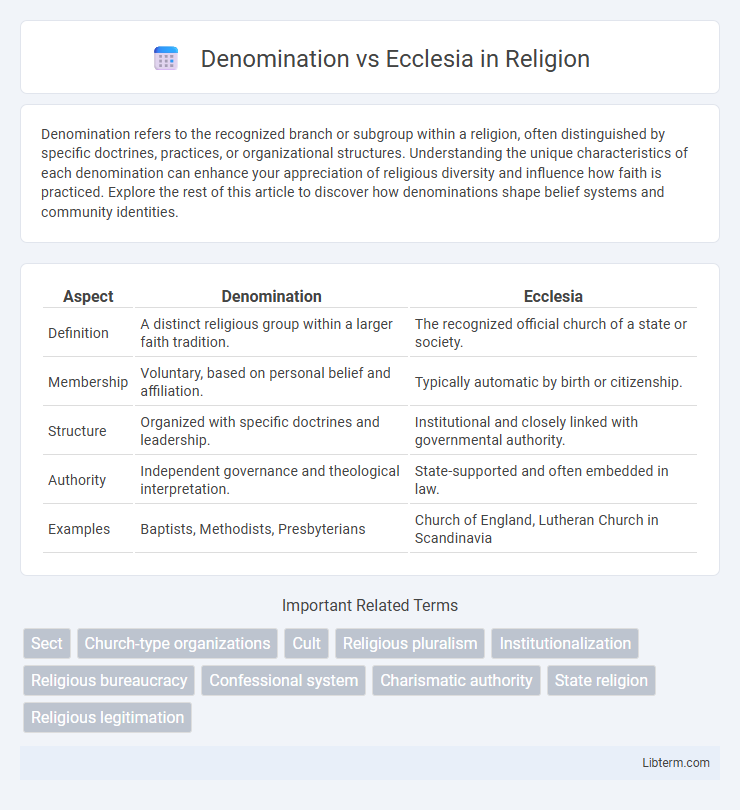Denomination refers to the recognized branch or subgroup within a religion, often distinguished by specific doctrines, practices, or organizational structures. Understanding the unique characteristics of each denomination can enhance your appreciation of religious diversity and influence how faith is practiced. Explore the rest of this article to discover how denominations shape belief systems and community identities.
Table of Comparison
| Aspect | Denomination | Ecclesia |
|---|---|---|
| Definition | A distinct religious group within a larger faith tradition. | The recognized official church of a state or society. |
| Membership | Voluntary, based on personal belief and affiliation. | Typically automatic by birth or citizenship. |
| Structure | Organized with specific doctrines and leadership. | Institutional and closely linked with governmental authority. |
| Authority | Independent governance and theological interpretation. | State-supported and often embedded in law. |
| Examples | Baptists, Methodists, Presbyterians | Church of England, Lutheran Church in Scandinavia |
Introduction to Denomination and Ecclesia
Denomination refers to a recognized autonomous branch within Christianity, characterized by distinct doctrines, governance, and worship practices, such as Baptist or Methodist churches. Ecclesia, in contrast, denotes the universal gathering of believers called out for a specific religious purpose, often emphasizing the inclusive body of Christ beyond denominational boundaries. Understanding these concepts highlights the structural and theological differences shaping Christian identity and community organization.
Defining Denomination: Key Characteristics
Denomination refers to a distinct religious group within Christianity characterized by a shared name, doctrine, and organizational structure, often operating under a formal hierarchy and recognized governance. Key characteristics include a unified theology, established worship practices, and a membership body that identifies with specific creeds or confessions. Unlike the broader concept of ecclesia, which denotes the general assembly or church, denominations represent organized subgroups with defined boundaries and institutional frameworks.
Understanding Ecclesia: Core Features
Ecclesia represents a religious community recognized as an official religion by the state, embodying a comprehensive societal integration and universal membership within a particular culture. Unlike denominations, which are independent religious groups separated by doctrinal differences, ecclesia maintains a close relationship with governmental structures and social institutions, underscoring its authoritative role in public life. Core features of ecclesia include widespread cultural acceptance, state endorsement, and an inclusive approach to religious participation among the population.
Historical Origins of Denomination and Ecclesia
Denominations originated during the Protestant Reformation in the 16th century as distinct Christian groups separated from the Roman Catholic Church, emphasizing doctrinal differences and ecclesiastical organization. Ecclesia, deriving from the Greek term used in the New Testament, originally referred to an assembly or congregation of believers unified in worship and purpose without strict institutional divisions. Historical development shows denominations formalizing structured theological frameworks and governance, while ecclesia remains a broader concept for collective worship communities.
Structural Differences: Organization and Governance
Denomination and ecclesia differ significantly in organization and governance structures, with denominations typically featuring formalized hierarchies, standardized doctrines, and centralized authority overseeing multiple congregations. Ecclesiae often exhibit more autonomous governance, prioritizing local leadership and flexible organizational frameworks without overarching denominational control. These structural distinctions affect decision-making processes, doctrinal enforcement, and the degree of institutional uniformity across worship communities.
Membership Patterns in Denomination vs Ecclesia
Membership patterns in denominations typically involve formal affiliation through rituals such as baptism or confirmation, with individuals maintaining voluntary participation based on shared beliefs and organizational structure. Ecclesia membership tends to be automatic by virtue of citizenship or cultural identity, encompassing the majority of a society's population with less emphasis on active personal commitment. Denominations often experience diverse and fluid membership participation, while ecclesia membership is generally stable and widespread within its social context.
Sociological Implications and Social Integration
Denomination and ecclesia represent distinct religious groupings with significant sociological implications for social integration. Denominations function as voluntary associations within pluralistic societies, promoting individual identity and accommodating diversity, which encourages social pluralism and cohesion. Ecclesia, often aligned with the state or dominant culture, fosters a unified social order by integrating religion into societal norms, reinforcing collective identity and social stability.
Influence on Society and State Relations
Denominations often maintain distinct identities within broader religious frameworks, influencing society through localized community engagement and shaping state relations via advocacy for specific moral or social issues. Ecclesia, representing state-recognized or official churches, typically exerts a more formal influence on governance and legal frameworks, reinforcing state authority within religious contexts. The interplay between denominations and ecclesia affects public policy, societal norms, and the balance between religious freedom and state regulation.
Contemporary Examples of Denomination and Ecclesia
Denomination refers to distinct religious groups within Christianity characterized by unique doctrines, governance, and worship styles, such as the Baptist Church and the United Methodist Church, which both exemplify contemporary Protestant denominations. Ecclesia denotes a church or assembly that encompasses the entire body of believers, often representing a national church like the Church of England or the Roman Catholic Church, which functions as an institutional ecclesia with official state recognition. Contemporary examples highlight denominations as diverse, autonomous organizations, whereas ecclesia represents centralized, state-aligned religious bodies integrating faith and national identity.
Conclusion: Comparing Denomination and Ecclesia
Denomination and Ecclesia represent distinct forms of Christian organization with denominations typically structured as formal, institutionalized groups encompassing multiple congregations and adherence to established doctrines. Ecclesia refers to a more organic, often local assembly of believers emphasizing community and spiritual fellowship without rigid bureaucratic frameworks. Understanding their differences highlights how denominations prioritize organizational identity and doctrine, whereas ecclesia focuses on communal worship and spiritual unity.
Denomination Infographic

 libterm.com
libterm.com